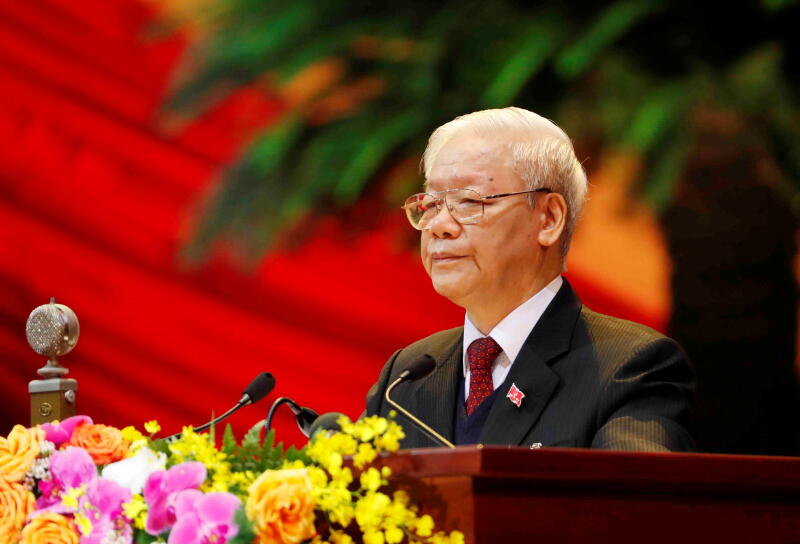Vietnam ruling Communist Party chief Trong re-elected for 3rd term
Sign up now: Get insights on Asia's fast-moving developments

Nguyen Phu Trong, 76, was granted an exception to party rules which say people over the age of 65 should retire.
PHOTO: REUTERS
BANGKOK - Vietnam's ruling communist party on Sunday (Jan31) re-elected its general secretary Nguyen Phu Trong for a third term, making him one of the country's longest serving leaders.
The party waived its age and term limits to allow him to continue in his role, cementing the power of the 76-year-old Hanoi native who has concurrently held the largely ceremonial role of president since 2018.
On the penultimate day of the party's five-yearly National Congress - which was cut short by a new coronavirus outbreak in northern Vietnam - the party did not make public who would fill the other key posts of president, prime minister and national assembly chief.
But the front runners named by analysts include current prime minister Nguyen Xuan Phuc, party central organisation commission chief Pham Minh Chinh and Hanoi party secretary and former deputy prime minister Vuong Dinh Hue.
Mr Trong, first elected general secretary in 2011, has overseen a "blazing furnace" anti-corruption campaign that has put senior party members and their cronies behind bars for decades. Many of them were linked to former prime minister Nguyen Tan Dung.
The communist country has been a bright spot in the battle against the Covid-19 pandemic, successfully containing earlier waves of infections through aggressive contact tracing, quarantine and lockdowns.
While gross domestic product for many regional countries shrank, Vietnam's economy grew an estimated 2.9 per cent last year. The World Bank projects it will expand 6.7 per cent this year.
On Sunday, the authorities announced 50 more Covid-19 infections, and declared that all schools in Hanoi would be shut to contain the outbreak that first emerged last week (Jan27).
As of Sunday, the country has logged 1,817 cases and 35 deaths.
Vietnam was named last week by Australia's Lowy Institute as the second best-performing country - behind New Zealand - for its pandemic management.
But Vietnam's overall performance in its efforts against corruption is not so clear. While its score in Transparency International's Corruption Perceptions Index has been generally improving in recent years, it ranked 104 out of 180 countries and territories last year, suggesting more substantial changes are needed.
Mr Trong's anti-corruption campaign is said to have slowed decision-making by officials wary of being faulted for economic mismanagement.
Dr Huynh Tam Sang, a lecturer at the University of Social Sciences and Humanities at Vietnam National University, expects Mr Trong to continue his anti-corruption campaign, but warns that his concentration of power may undermine the party's principle of collective leadership and internal consultation, termed "democratic centralism".
"It could undermine democracy, with little prospect for diversity of opinions raised by low-level party members," he told The Straits Times. Any challenge to his leadership could destabilise the party, he said.
Ms Linh Nguyen, associate director at Control Risks, says Mr Trong's re-election "indicates that Vietnam is facing a serious succession problem, and raises a big question over future of younger leaders who are competent but less orthodox cadres".
"While political stability in Vietnam remains strong, signs of Trong's weaker grasp on power, most likely triggered by his deteriorating health, could cause the re-emergence of factional infighting in the party, and therefore presents the biggest risk to Vietnam's stability in the next two to five years."


